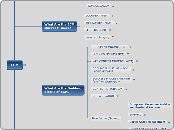ECM
Enterprise Content Management (ECM) is software that helps you organize and control all of the unstructured information in your entire organization. Unstructured information includes all of your content—documents, images, drawings, audio and video files, e-mails, faxes, etc.—in every type of file and format available.ECM also manages content collected by other enterprise applications such as enterprise resource planning (ERP), customer relationship management (CRM), supply chain management, and enterprise portals. Offering the user common desktop applications, easy-to-use templates, and simple creation and capture procedures, ECM can also create categorization schema, tags, and metadata that make search and retrieval faster and more efficient.ENTERPRISE CONTENT MANAGEMENT (ECM)ECM is a corporate initiative to identify, capture and disseminate unstructured information throughout the company.ECM is the integration of various technologies and processes to manage enterprise content from conception through deployment.ECM is not Knowledge Management, which is the process by which companies generate value from their intellectual assets through the efficient sharing of knowledge enterprise-wide. It's also not document management, which is the effective storage and retrieval of documents. Of course document management is a part of ECM, but it's not the whole.
DEFINICION
Tecnologias para tratar el contenido y los documentos relacionados con los procesos organizacionales. (AIIM)
UNA NECESIDAD ESTRATEGICA
Unstructured content at most organizations is increasing at a phenomenal rate and is resulting in information that is lost, repeated, and/or out- of-date.Gartner Research (What Constitutes Enterprise Content Management, Gartner, 2004) states that a forward-thinking organization should “Think of enterprise content management as a strategy rather than a project or product.Plan for a consistent enterprise-wide content architecture. Identify the particular functions you need and ensure that the solution you’re considering integrates them adequately. An ECM suite will make sense for most companies, but vendors differ in the number of components they offer and in the level of integration... ECM is an architecture that integrates functions to make content accessible enterprise-wide. This approach works best for supporting horizontal business processes, such as compliance, and reducing long-term costs. For these reasons, most companies should implement as ECM strategy even if they start with only one or two core components.”
